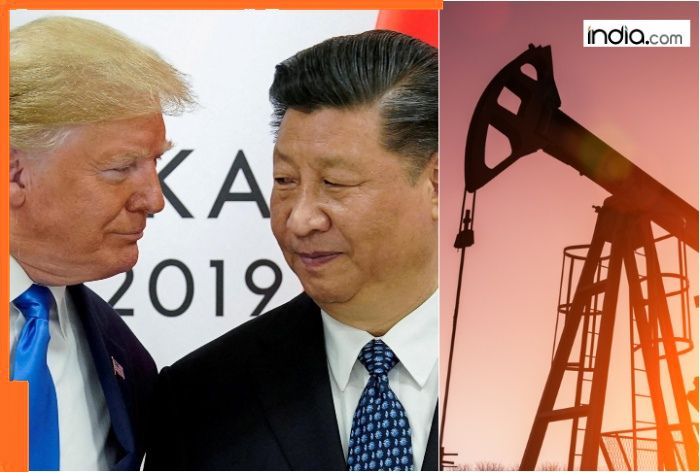World
China Discovers Major Shale Oil Reserves Amid US Sanctions

China has made a significant discovery of shale oil reserves in the Sichuan Basin, producing over 705,000 tons of shale oil in 2024. This figure reflects an increase of 308,000 tons from the previous year, coinciding with newly imposed US sanctions targeting Russian oil companies. The discovery not only enhances China’s energy independence but also poses a challenge to the United States’ efforts to disrupt China’s energy supply.
Chinese media reports indicate that the shale oil and gas reserves found are capable of producing 38.64 cubic meters of oil and 10,000 cubic meters of gas per day. The newly identified shale oil field, located in the Qijiang district of Chongqing Municipality, has an estimated reserve of over 100 million tons. This breakthrough represents a critical advancement in securing China’s long-term energy needs.
Details of the Discovery
The shale oil well, named Qiluye-1, was drilled to depths exceeding 2,000 meters. The horizontal section of the well extends over two kilometers, revealing approximately 40 meters of oil-bearing shale. According to a report by state-owned China Central Television (CCTV), the region boasts a new type of high-quality shale layer that stretches over 1,000 kilometers.
A representative from the Sinopec exploration branch noted that the shale oil found at Qiluye-1 is located at a shallow depth, suggesting that it has high-quality reserves, which could yield significant economic benefits. In addition to this discovery, China had previously uncovered a massive shale gas field in Qijiang in 2022, further expanding the region’s energy portfolio.
In 2025, Sinopec has already reported over 200 million tons of proven geological reserves of shale oil along with 12.35 billion cubic meters of gas, indicating a robust growth trajectory in the sector.
Impact of US Sanctions
The timing of this discovery is particularly critical, as it comes in the wake of renewed sanctions imposed by Donald Trump on Russian oil giants like Rosneft and Lukoil. These sanctions are intended to cripple Russia’s oil exports, and they have already prompted significant shifts in the global oil market. Indian oil refiners, including those led by Mukesh Ambani and Reliance Industries, have started reevaluating their oil procurement strategies concerning Russia.
China, which imports around 1.4 million barrels of Russian oil daily—primarily from private firms—faces potential challenges to its energy security due to these sanctions. As several Chinese companies also suspend their purchases of Russian oil to comply with the new regulations, the discovery of shale oil reserves could be a crucial lifeline. By bolstering its domestic oil production, China aims to mitigate the impact of US sanctions and stabilize its energy supply.
This substantial shale oil find not only enhances China’s energy independence but also positions the country to potentially offset the repercussions of international sanctions. As global energy dynamics shift, China continues to strengthen its position within the energy sector, ensuring that its needs are met internally and reducing reliance on foreign sources.
-

 World4 months ago
World4 months agoSBI Announces QIP Floor Price at ₹811.05 Per Share
-

 Lifestyle4 months ago
Lifestyle4 months agoCept Unveils ₹3.1 Crore Urban Mobility Plan for Sustainable Growth
-

 Science4 months ago
Science4 months agoNew Blood Group Discovered in South Indian Woman at Rotary Centre
-

 World4 months ago
World4 months agoTorrential Rains Cause Flash Flooding in New York and New Jersey
-

 Sports4 months ago
Sports4 months agoBroad Advocates for Bowling Change Ahead of Final Test Against India
-

 Top Stories4 months ago
Top Stories4 months agoKonkani Cultural Organisation to Host Pearl Jubilee in Abu Dhabi
-

 Science4 months ago
Science4 months agoNothing Headphone 1 Review: A Bold Contender in Audio Design
-

 Top Stories4 months ago
Top Stories4 months agoAir India Crash Investigation Highlights Boeing Fuel Switch Concerns
-

 Sports4 months ago
Sports4 months agoCristian Totti Retires at 19: Pressure of Fame Takes Toll
-

 Business4 months ago
Business4 months agoIndian Stock Market Rebounds: Sensex and Nifty Rise After Four-Day Decline
-

 Politics4 months ago
Politics4 months agoAbandoned Doberman Finds New Home After Journey to Prague
-

 Top Stories4 months ago
Top Stories4 months agoPatna Bank Manager Abhishek Varun Found Dead in Well








